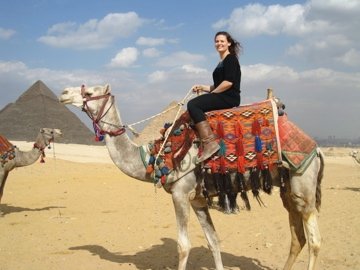Wellesley College Student Awarded Watson Fellowship
for a Year of Travel and Exploration
Alison Harrington Will Document the Experience
of Muslim Policewomen Worldwide
FOR IMMEDIATE RELEASE:
March 22, 2010 |
|
WELLESLEY, Mass.— Growing up, Wellesley College senior Alison Harrington was fascinated by women involved in law enforcement, immersing herself in stories of childhood heroines like Nancy Drew and Charlie’s Angels. She wanted to be like those women — powerful and admired. While at Wellesley, her interest in crime-fighting led to an internship with the U.S. Department of Defense, where she researched active terrorist networks.
 |
Wellesley senior Alison Harrington will travel to Turkey, Morocco, the United Arab Emirates, Indonesia and Bangladesh to research the role of Muslim women in policing and peacekeeping. Her year of exploration is funded by a prestigious Thomas J. Watson Foundation Fellowship. |
Harrington later spent a semester abroad, where she was surprised to find strong and powerful women in an unexpected place — working to protect the streets of Amman, Jordan, as police officers. She began a case study on the women, who defied the stereotypes of Muslim women in the Middle East.
“Despite my academic preparation, I had biased notions of Muslim women as confined to the home by tradition or choice,” she said. “I had never imagined women in a Muslim country working in a male-dominated field like law enforcement, especially as the United States still struggled with gender equality in its own law enforcement divisions.”
Harrington, the daughter of Kathleen Canavan and Brian Harrington of Westford, Mass., will continue her study with the project, “Rewriting the Rules: Muslim Women in Policing and Peacekeeping,” funded by a prestigious Thomas J. Watson Foundation Fellowship. One of only 40 students nationwide to be awarded the fellowship, Harrington will receive $25,000 for a year of travel and exploration.
For her project, Harrington will travel to Turkey, Morocco, the United Arab Emirates, Indonesia and Bangladesh to interview female police officers in urban and rural police departments. She will document the challenges they face, as well as their influence on their communities.
She will also explore job qualifications and responsibilities that vary due to local culture for women, including carrying a weapon, undergoing a virginity test, having a father’s permission to enroll, requiring an exclusively female station, enforcing the Islamic veil, differences between male and female job responsibilities and the acceptability of male and female partners. She will also explore bigger questions, including: Are female police officers viewed as role models for younger women? Do they expedite the pace of gender equality? Do their views on law enforcement differ from male officers?
“The image of a female police officer rejects not only the traditional domestic role for women in Muslim societies but also challenges the status quo by redefining power and authority itself,” Harrington said. “By the end of my Watson year, I hope to better understand the challenges faced by women around the world in entering traditionally male dominated careers."
She hopes her experience will “serve as a template for making a much larger global impact.”
This year’s Watson fellows will travel to 76 countries, exploring topics from the use of hip-hop music in holistic healing, to cocoa production, to the use of bicycles worldwide.
“These awards are long-term investments in people, not research,” said Cleveland Johnson, director of the Watson Fellowship Program and a former Watson Fellow. “We look for persons likely to lead or innovate in the future and give them extraordinary independence to pursue their interests outside of traditional academic structures. Watson Fellows are passionate learners, creative thinkers and motivated self-starters who are encouraged to dream big but demonstrate feasible strategies for achieving their fellowship goals.”
Earlier this year, Harrington was named a fellow of the Madeleine Korbel Albright Institute for Global Affairs at Wellesley, which prepares women for positions of global leadership. Her participation in the institute began with an intensive course in January, where she took lessons from various international relations and public policy experts, including Albright herself, former U.S. secretary of state and a member of the Wellesley class of 1959. This summer, she will pursue a Wellesley-funded internship in Jerusalem or Doha, Qatar, applying what she’s learned in a real-life setting.
Harrington, a political science and Middle Eastern studies double major, spent a semester abroad studying Arabic in Jordan. In addition to her time with the Department of Defense, she has interned at the American-Arab Anti-Discrimination Committee and at Albright Stonebridge Group, building private partnerships abroad. At Wellesley, she is an academic peer tutor coordinator at the Pforzheimer Learning and Teaching Center and a peer resource advisor at the Center for Work and Service. She has served as the student editor on the International Relations Council Journal.
Following her Watson year, Harrington plans to pursue a career in international security, to perfect her Arabic language skills and possibly to return to the Department of Defense.
Since 1875, Wellesley College has been a leader in providing an excellent liberal arts education for women who will make a difference in the world. Its 500-acre campus near Boston is home to 2,300 undergraduate students from all 50 states and 75 countries.
###
|

